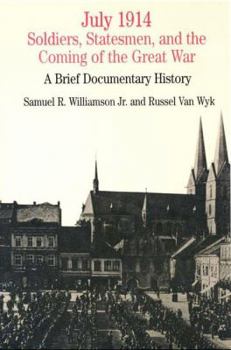July 1914: Soldiers, Statesmen, and the Coming of the Great War: A Brief Documentary History
Select Format
Select Condition 
Book Overview
Historians have long sought to explain how the world descended into war in the wake of the assassination of Archduke Franz Ferdinand and his wife on June 28, 1914. Focusing on the interactions between... This description may be from another edition of this product.
Format:Paperback
Language:English
ISBN:0312120109
ISBN13:9780312120108
Release Date:February 2003
Publisher:Bedford Books
Length:284 Pages
Weight:0.70 lbs.
Dimensions:0.5" x 5.5" x 8.4"
Customer Reviews
1 rating
A Country-by Country Summary of the July Crisis
Published by Thriftbooks.com User , 18 years ago
I found July 1914, edited by Samuel Williamson and Russel Van Wyk to be an interesting supplement as to James Joll's The Origins of the First World War. July 1914 analyzed the reaction of each of the great powers of Europe, along with Serbia, to the assassination of Franz Ferdinand of Austria-Hungary. This book was a combination of primary sources, including letters, state documents, telegrams, and newspaper editorials, along with background information provided by the authors. The book's overall purpose was to analyze what went wrong: why did a seemingly trivial incident escalate into the second worst war in history? While none of the powers claimed to have wanted a war, they all (with the possible exception of Italy) really did. They just did not want war declared in July 1914. Upon reading the primary sources, it is clear that most of the European leaders wanted the war postponed for a few months or years. Austria-Hungary, Russia, and France were not ready for a war then because most of their soldiers were on leave harvesting their crops. Russia would have preferred to delay the outbreak of the war for two or three years to complete their industrialization and military preparations, but they could not back down to the Central Powers a third time or they feared that they would lose all credibility in the Balkans. France, nervous that she had a population just two-thirds that of Germany, wanted to wait until her eastern ally was ready. Serbia's army was exhausted after fighting the two Balkan Wars. England was dealing with internal issues and faced the threat of rebellion in Ireland. Germany was the only power that sensed that this was the opportune time to fight; they viewed the outbreak of war in July-August 1914 as a pre-emptive strike before Russia was fully prepared. Williamson and Van Wyk confirmed Joll's thesis that Germany and Austria-Hungary started the war because they knew that things would be much worse on the Eastern Front in a couple of years. Austria-Hungary (ir at least the duo of Leopold Berchtold and Conrad von Hotzendorff also wanted war, hoping that a decisive victory over Serbia would pacify their Slavic subjects. It is important to note that none of the Allied powers seemed to be willing to back off, either. The authors believed that the lack of civilian control of the military (except in the case of France) was a major cause of the war. Although Serbian Prime Minister Nikola Pasik opposed the assassination, he was unable to prevent Dragutin "Apis" Dimitrijevic from being able to carry it out, let alone fully cooperate with Austria-Hungary because he feared the quasi-governmental Black Hand organization (this is similar to how people question whether Mahmoud Abbas could control Hamas or other Palestinian terrorist organizations even if he wanted to). German Chief of Staff Helmuth von Moltke did not have to answer to the Reichstag. The Russian system discouraged cooperation between the army and c






